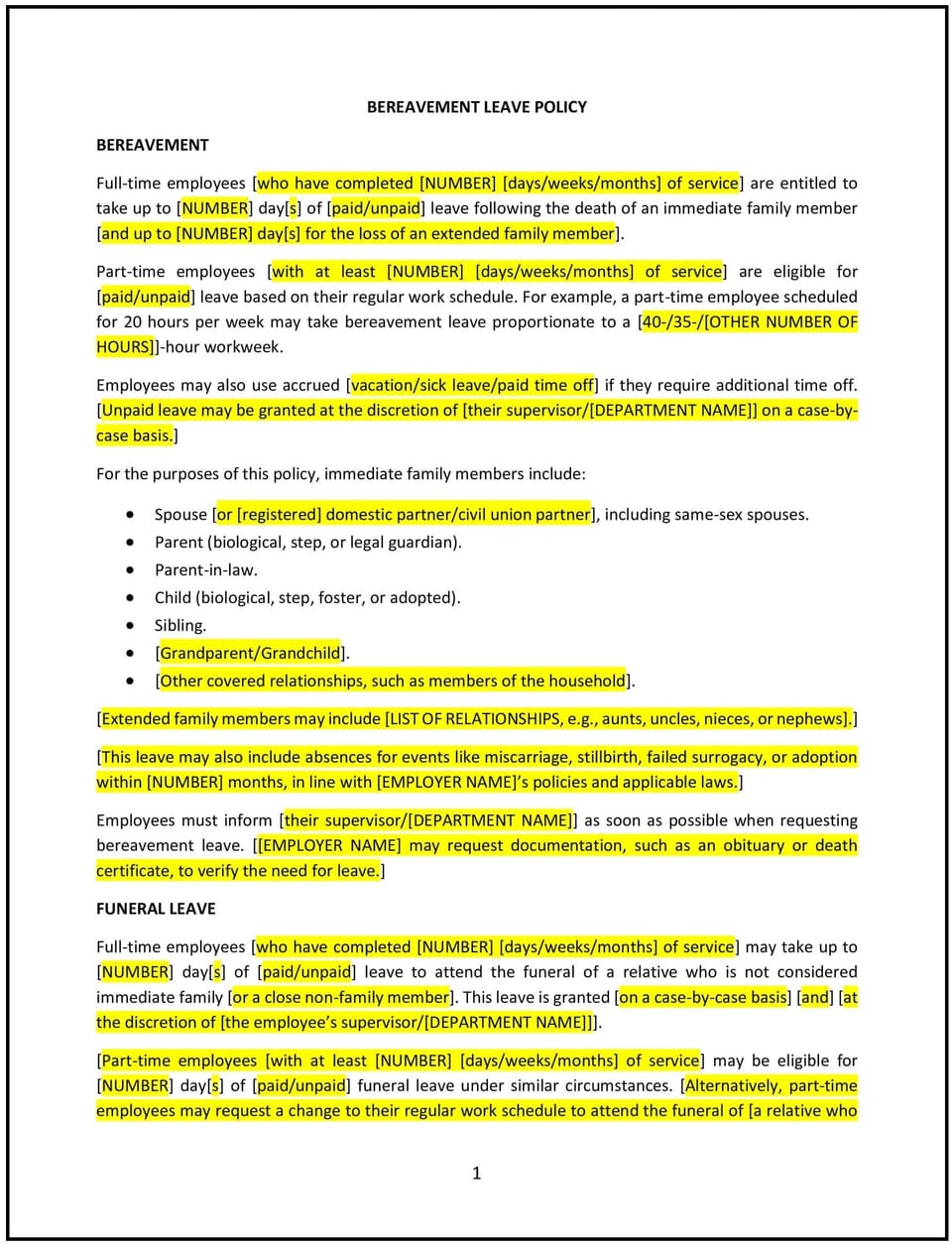Bereavement leave policy (Hawai'i): Free template

Bereavement leave policy (Hawaiʻi)
A bereavement leave policy helps Hawaiʻi businesses support employees during difficult times by providing paid or unpaid time off to grieve and attend to matters following the death of a loved one. This policy outlines eligibility, duration, and procedures for requesting leave, while considering Hawaiʻi-specific workplace dynamics and cultural sensitivities. It is designed to promote empathy, work-life balance, and employee well-being.
By implementing this policy, businesses in Hawaiʻi can demonstrate compassion, strengthen employee loyalty, and foster a supportive workplace culture.
How to use this bereavement leave policy (Hawaiʻi)
- Define eligibility: Specify which employees are eligible for bereavement leave, such as full-time, part-time, or temporary workers, and whether the policy applies to probationary employees.
- Outline covered relationships: List the relationships that qualify for bereavement leave, such as immediate family members (spouse, children, parents) and extended family (siblings, grandparents, in-laws).
- Determine leave duration: Establish the amount of leave provided, such as three to five days, and whether it is paid or unpaid. Consider offering flexibility for exceptional circumstances.
- Establish request procedures: Provide clear instructions for employees to request bereavement leave, including required documentation, such as a death certificate or obituary, if applicable.
- Communicate the policy: Share the policy with employees during onboarding and through internal communications to ensure awareness and understanding.
- Train managers: Educate supervisors on how to handle bereavement leave requests with empathy and consistency.
- Review and update the policy: Regularly assess the policy’s effectiveness and make adjustments as needed to reflect changes in employee needs or workplace dynamics.
Benefits of using this bereavement leave policy (Hawaiʻi)
This policy offers several advantages for Hawaiʻi businesses:
- Demonstrates compassion: Providing bereavement leave shows employees that the business values their well-being during difficult times.
- Strengthens employee loyalty: A supportive policy can increase employee satisfaction, retention, and morale.
- Promotes work-life balance: Bereavement leave allows employees to grieve and handle personal matters without the added stress of work obligations.
- Enhances workplace culture: A compassionate policy fosters a sense of community and mutual support among employees.
- Reduces absenteeism: By offering structured leave, businesses can minimize unplanned absences and maintain productivity.
- Aligns with cultural values: Hawaiʻi’s close-knit communities and cultural emphasis on family make bereavement leave particularly meaningful in this context.
Tips for using this bereavement leave policy (Hawaiʻi)
- Communicate the policy effectively: Share the policy with employees during onboarding and through regular reminders, such as emails or employee handbooks.
- Be flexible: Consider extending leave or offering additional support for employees dealing with particularly challenging circumstances.
- Train managers: Ensure supervisors understand the policy and handle requests with empathy and consistency.
- Respect privacy: Allow employees to grieve privately and avoid unnecessary inquiries about their loss.
- Offer additional resources: Provide access to counseling services or employee assistance programs (EAPs) to support employees during their grieving process.
- Review the policy periodically: Update the policy as needed to reflect changes in employee needs, workplace dynamics, or cultural considerations.
Q: Why should Hawaiʻi businesses adopt a bereavement leave policy?
A: Businesses should adopt this policy to support employees during difficult times, demonstrate compassion, and foster a positive workplace culture.
Q: Who is eligible for bereavement leave?
A: Eligibility should be clearly defined in the policy, typically including full-time and part-time employees. Businesses should decide whether to extend eligibility to temporary or probationary workers.
Q: What relationships qualify for bereavement leave?
A: The policy should specify covered relationships, such as immediate family members (spouse, children, parents) and extended family (siblings, grandparents, in-laws).
Q: How much leave should businesses provide?
A: Businesses should determine the duration of leave, typically three to five days, and decide whether it is paid or unpaid. Flexibility for exceptional circumstances is recommended.
Q: How should employees request bereavement leave?
A: Employees should follow the procedures outlined in the policy, which may include notifying their supervisor and providing documentation, such as a death certificate or obituary, if required.
Q: Should businesses offer additional support for grieving employees?
A: Businesses should consider offering additional resources, such as counseling services or employee assistance programs (EAPs), to support employees during their grieving process.
Q: How often should the policy be reviewed?
A: The policy should be reviewed annually or as needed to reflect changes in employee needs, workplace dynamics, or cultural considerations.
This article contains general legal information and does not contain legal advice. Cobrief is not a law firm or a substitute for an attorney or law firm. The law is complex and changes often. For legal advice, please ask a lawyer.


